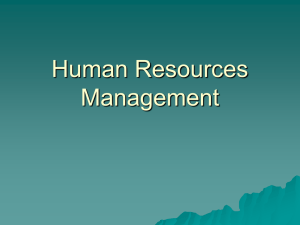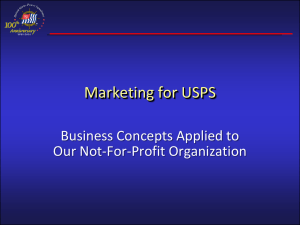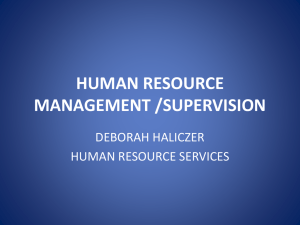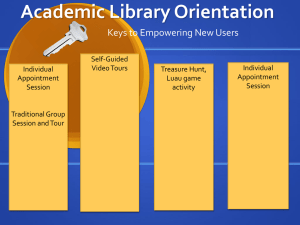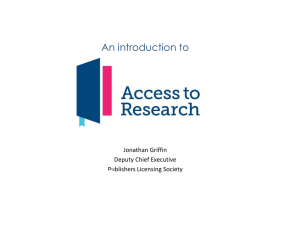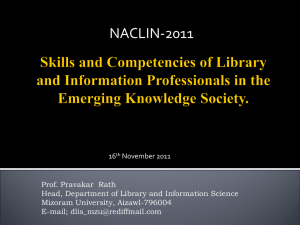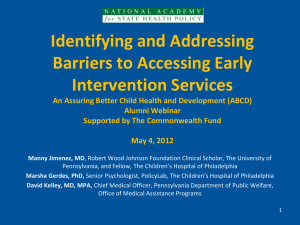Overview Performance Evaluation
advertisement
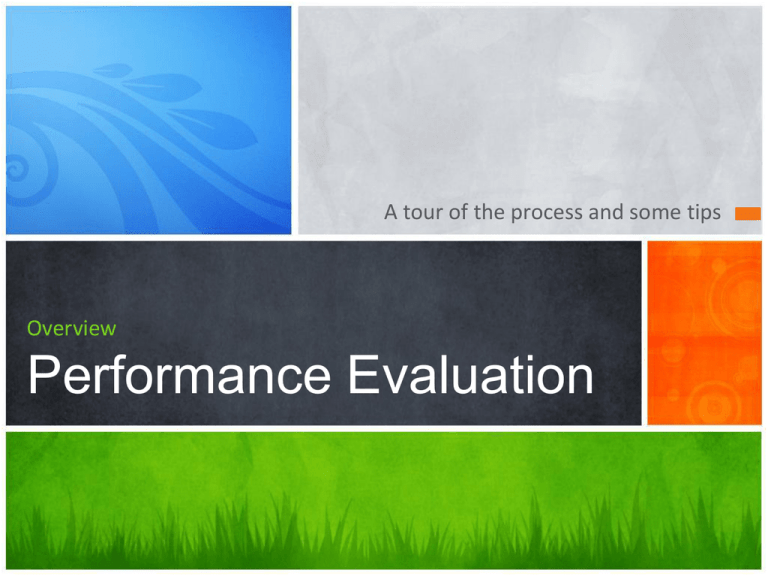
A tour of the process and some tips Overview Performance Evaluation Our mission today Why annual performance evaluation? What is part of the evaluation? UF process Evaluation best practices and giving feedback – Tips Where are you headed? – Goals HELLO INTRODUCTIONS your NAME where you WORK favorite part of your job Why is evaluation important? • What am I doing well? • How can I improve? • What are the • skills, • knowledge, and • behaviors I need to be successful? • Two way conversation • STOP - look back and take stock STOP Listen Learn What am I evaluated on? 1 Job performance • • 2 Skills knowledge Work-related behavior Competencies What am I evaluated on? 1 Job performance includes: Position Description Goals from last year Additional endeavors? Initiatives? What am I evaluated on? Observable behaviors Teamwork Communication – Interpersonal Skills 2 Work-related behavior UF Process Annual Evaluation – March 1 – February 28 Self assessment To supervisor Supervisor completes evaluation 2nd level supervisor review Share with employee Meet with employee Finalize evaluation Submit to employee Submit to Libraries HR By March 25th UF provides two USPS and TEAMS evaluation formats The Form – For All USPS and hourly TEAMS employees The Cover Sheet & Letter For TEAMS exempt employees UF provides two USPS and TEAMS evaluation formats The Form – For All USPS and hourly TEAMS employees BOTH • Available as writable Word document • Libraries require 2nd level supervisor signature • Strongly encourage employee self assessment • Top section information provided by HR • Include a statement about conflict of interest • Require overall rating The Cover Sheet & Letter For TEAMS exempt employees Overall Ratings Exceeds Above Average Below Performance Standards Contact Libraries HR Minimally Achieves Achieves The Form All USPS and TEAMS non-exempt Performance Categories Attendance Work Performance and Reliability Initiative Customer Service and Productivity Teamwork and Interpersonal Skills Work Performance What types of things might you evaluate or be evaluated on in this category? Attendance and Reliability What types of things might you evaluate or be evaluated on in this category? Customer Service What types of things might you evaluate or be evaluated on in this category? • Assistance • Presentation/Demeanor • Communication/Respect • Service • Phone manner • Electronic communication Initiative and Productivity What types of things might you evaluate or be evaluated on in this category? Teamwork and Interpersonal Skills What types of things might you evaluate or be evaluated on in this category? • Cooperation • Collaboration • Flexibility • Consensus • Supportive Performance Category Ratings Exceeds Achieves Above Average 5 4 Minimally Achieves 2 3 Below 1 Rate Each Performance Category Overall Ratings Exceeds Achieves Above Average 25-24 23-20 19-15 Minimally Achieves 9-5 Contact Libraries HR 14-10 Below The Cover Sheet and Letter TEAMS exempt Writing the letter Use the Performance Categories Use the Position Description Don’t forget past and future Goals Give an Overall Rating on Cover Sheet Best practices for creating a Learning Organization with a culture that strengthens collaborative initiatives. Best Practices Think about it… Employees want to work for people who have their back – the more real and authentic you are the more you build your relationship Think about it… To build rapport you need to express a real interest in the employee’s contributions to the work of the Libraries – Spend time preparing – Read the self evaluation – Be thoughtful in your delivery – Create dialogue Think about it… During the evaluation meeting: • Biggest mistake is when the manager does all the talking • Do NOT read the appraisal during the evaluation session – this is supposed to be a conversation Think about it… Specificity builds trust and dialogue Vague, not so much Think about it… As a manager it is your job to become an expert at giving feedback. Giving feedback What specific feedback could you give your employees that would make them feel part of the team and informed about what they are doing well? Giving feedback Hard to give negative (constructive) feedback but in reality we need/want it because without it we don’t grow Put the employee in the best place possible to be successful 7 Steps to giving constructive feedback 1. 2. 3. 4. Introduce the conversation Describe the behavior – ‘I’ve noticed…’ State the impact of the behavior Ask the person for their perception of the situation – ‘What are your thoughts?’ 5. Make a suggestion or request – ‘Would you be willing to do that?’ 6. Build an agreement on next steps 7. Say ‘thank you’ – ‘thanks for having this conversation with me I know it’s been awkward’ Giving feedback • “What?” • “Are you serious?” • “That’s not true” • “It’s just a rumor.” • “Who said that?” • “You want to fire me don’t you?” • “After all I do for them this is what I get” • “Nobody is perfect – we all have faults” • “That’s just the way I am… take it or leave it.” • “If that’s the thanks I get for working hard then…” • “How can I best use this feedback?” • “What can I do to improve?” • “Who can help me change?” review of last year is important but well written GOALS help predict future success GOALS ‘a goal without a plan is just a wish’ GOALS Based on the position description Outline objectives and specific activities Discussed Considerations • Review position description (update it!) TRAINING Writing and Updating Position Descriptions • 3/9 – LW • 3/13 – ILF • 3/17 - MSL • Review prior year’s goals and comment on whether or not they were accomplished • Review employee’s goals for coming year if provided Considerations • HAVE A CONVERSATION • Consider training needs • Consider departmental goals • Refer to the Libraries Strategic Directions • Consult the Competencies Training Matrix https://www.uflib.ufl.edu/competencies/ TRAINING Staff Competencies Training Matrix • 2/17 – MSL Tips for writing goals • Don’t wait for your supervisor to suggest writing goals. Write 3 – 4 goals. • Discuss each goal with supervisor • Understand how they relate to the goals of the department/why they matter Ask yourself: • What results will you produce? • What will be different in your department or the libraries? • What will you do and when will you do it? • How will you know you’ve made progress? SMART GOALS Performance Goals must be: S Specific & Strategic Outline exactly what you hope to accomplish and what the impact will be. M Measurable There must be some way of measuring and verifying whether the objective has been achieved and to what level. A Appropriate The objectives must be relevant to the level at which the individual is at in his/her career, to the priorities and workload of the specific department. R Realistic Attainable; not so lofty that you can’t achieve them and not so simple that you won’t be challenged. T Timely Need to have clear time frames attached to them. Example 1 Develop 3 new trainings [that respond to training gaps in the competencies training matrix] - One training on improving presentation skills, one on emergency procedures and one on customer service - Trainings delivered in April, August and January Example 2 Collaborate with other circulation supervisors to design an online guide for student assistants [to improve the time it takes to train them and make it more consistent throughout the Libraries] - The guide should include links to key documents and other resources. - And should be available for Fall 2012 incoming student assistants. SMART GOALS Performance Goals must be: S Specific & Strategic Outline exactly what you hope to accomplish and what the impact will be. M Measurable There must be some way of measuring and verifying whether the objective has been achieved and to what level. A Appropriate The objectives must be relevant to the level at which the individual is at in his/her career, to the priorities and workload of the specific department. R Realistic Attainable; not so lofty that you can’t achieve them and not so simple that you won’t be challenged. T Timely Need to have clear time frames attached to them. ? Have we missed anything? ! What is your ‘take away’? Joe Piazza & Bonnie Smith Overview Thank You
